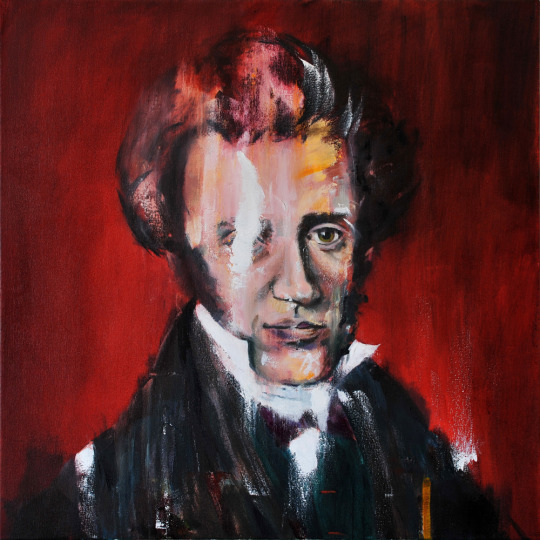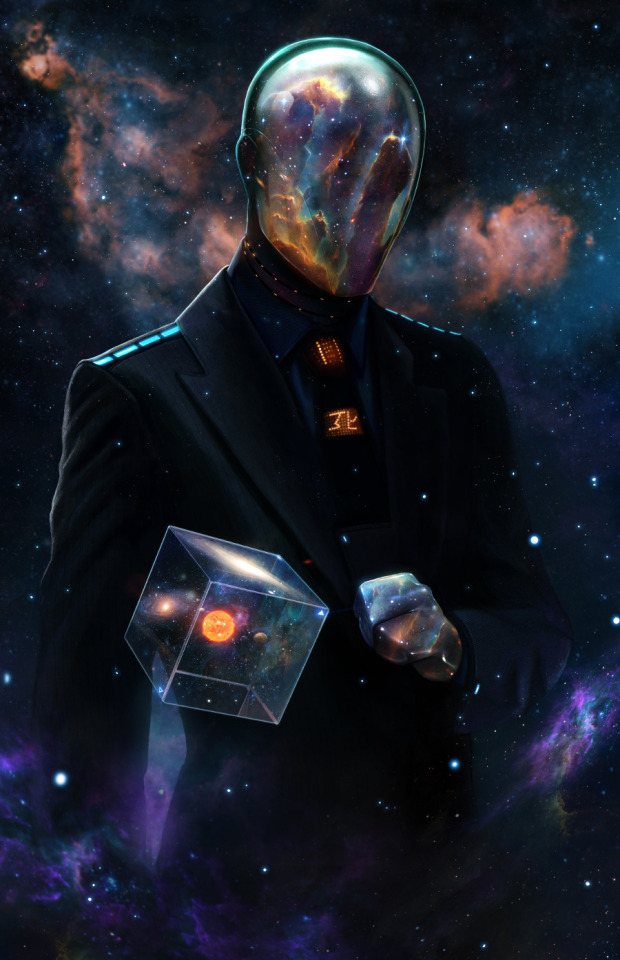#scientism
Text
So I’ve been wanting to write about this for a long time (my friends can probably attest to the fact I will talk about it unprompted) but I can’t find it way to do so concisely. Here’s my best try.
Is Mage: The Ascension (in its presentation of the Technocracy in specific) anti-science?
I don’t think so, not anymore. But I want to explain why. By the way, I have to imagine that this won’t be all that accessible if you don’t have much knowledge of Mage, but you’re free to stick around if you want to.
So, here’s the thing— the Technocratic Union is pretty much a stand-in for the advancement of the scientific method, “the Enlightenment,” all that. The whole point in the first edition of Ascension is that the Union is science, the science that dispelled notions of magic, and that this is a Bad Thing. They are oppressive, heartless, and cold. The villains, plain and simple.
In later editions, this gets softened, partly due to the notion of “Science is a conspiracy the elite uses to rule the world and keep you down” becoming less fun and more toxic as it gained more sincere believers, and partly because fans really liked the Technocracy.
I think the common read is that Ascension then took the direction of the Technocracy being anti-villains— the Union has noble goals, and many of its members are sincerely brave and compassionate, but ultimately it is too extreme, too callous. It has to be stopped.
This is, to be fair, an improvement over “science is evil,” but “science is too dangerous,” is still not great. And for a long time, this was my view on Mage: The Ascension. Fun ideas, maybe, but the core conflict of the game was just too reckless a portrayal of what seemed to me like a mirror of real-world conspiracist ideology.
And to some extent, I still think that. Especially in the early editions, this is a very fair critique. That said, the game still spoke to me as I looked into it, and for the longest time I wasn’t quite sure why. A piece of it was my own opening up to the notion of our subjective viewpoints affecting our reality— something that deserves its own rambling essay— but a related part of it was me realizing that there was something about the Technocracy that rung true to me, despite my misgivings. And I think I figured it out.
See, the Technocracy isn’t a stand-in for the scientific method, but for scientism.
If you’ve not heard the term, “scientism” is a controversial (we’ll get into why a bit later) pejorative term for the belief/perspective that science, as a body, composes essentially all useful and/or reliable knowledge about the world.
Notably, those who critique scientism rarely hold the view that scientific knowledge is bad or even inaccurate, just that it is an incomplete model of reality. This is not an anti-science position, but a skepticism towards the trust people place in its ability to solve every mystery. Vaccines, for example, are great! No one can reasonably dispute the benefits and efficacy of vaccination. When it comes to medicine, the scientific method has done incalculable good— the lives saved by vaccination alone are countless.
To be against scientism, then, is not to argue that medical science is a failure, or overrated— but to point out that there is more to life than being healthy. Everyone should be glad we have learned so much about treating illness and alleviating suffering. But what of having a sense of purpose? What about love and compassion and justice? What about satisfaction, having gone through a life worth living?
Again, none of that is to say that science or the scientific community is the problem. But if you take the Technocracy as an example of scientism gone to an extreme, one in which things like kindness and equity must be left behind in favor of only the virtue of material knowledge, I think Mage: The Ascension starts to really work.
(I originally intended to write a MUCH longer piece including references to the military-industrial complex, the rise of automation and AI, as well as the increasingly algorithmic nature of culture but this is so long already. And yet I worry I said essentially nothing. C’est la vie.)
#world of darkness#wod#mage the ascension#scientism#ramblings#probably shouldn’t have written this at work
88 notes
·
View notes
Text
Is Natural Science finally committed to materialism? There is no doubt that the theories of science constitute trustworthy knowledge, because they are verifiable and enable us to predict and control the events of Nature. But we must not forget that what is called science is not a single systematic view of Reality. It is a mass of sectional views of Reality - fragments of a total experience which do not seem to fit together. Natural Science deals with matter, with life, and with mind; but the moment you ask the question how matter, life, and mind are mutually related, you begin to see the sectional character of the various sciences that deal with them and the inability of these sciences, taken singly, to furnish a complete answer to your question. In fact, the various natural sciences are like so many vultures falling on the dead body of Nature, and each running away with a piece of its flesh. Nature as the subject of science is a highly artificial affair, and this artificiality is the result of that selective process to which science must subject her in the interests of precision. The moment you put the subject of science in the total of human experience it begins to disclose a different character.
Muhammad Iqbal, The Reconstruction of Religious Thought in Islam
#quote#Muhammad Iqbal#Iqbal#Allama Iqbal#science#nature#reality#scientism#Islam#Islamic philosophy#religion#natural sciences#natural science#theology#holism#integration#materialism#philosophy
45 notes
·
View notes
Text

54 notes
·
View notes
Text
As far as Polly could tell, Igors believed that the body was nothing more than a complicated kind of clothing. Oddly enough, that's what Nugganites thought, too.
Terry Pratchett, Monstrous Regiment
#polly perks#igor#the nugganites#monstrous regiment#discworld#terry pratchett#belief#body#identity#selfhood#science#scientism#religion#religious fundamentalism#similarities#a complicated kind of clothing#oddly enough
100 notes
·
View notes
Quote
That is the disastrous thing about the scientific way of thinking (which today possesses the whole world), that it wants to respond to every disquietude with an explanation.
Ludwig Wittgenstein, Nachlass, TS 219 (1 January 1933)
#philosophy#quotes#Ludwig Wittgenstein#Nachlass#science#scientism#explanation#reason#rationality#limitations
327 notes
·
View notes
Text
Race indeed mattered much less in classical antiquity than it does in modern times. But race did matter in classical antiquity [...]. The crucial difference seems to be that racial differences were justified on cultural grounds in classical antiquity, whereas at the inception of modern discourse, racial differences are often grounded in nature, that is, ontology and later biology.
Cornel West ("Race and Modernity," page 85 in his Reader)
5 notes
·
View notes
Text
FUCK I hate people who think they get to dictate other people's internal realities and call everyone that doesn't allow them to "delusional", who use a half-assed, bastardized, and fetishized definition of "science" as a cudgel to beat others with. The world may just be made out of easily definable atoms and molecules but the mind assigns it MEANING. It gives it NARRATIVE. It gives it POETRY. And to try to get in the way of that because it's "not real" is to do nothing less than strangle the human spirit itself.
#It was a TERF whining about chromosomes that set me off but this applies to a lot of things#Scientism#Vent
18 notes
·
View notes
Text

Soren Kierkegaard by Mike Newton (2017)
“Dewey: Do you remember the first book by Kierkegaard which you read?
Percy: Yes, it was his first one: Either/Or. I remember thinking that this was going to be an easy one because of the section on "The Diary of the Seducer" in there. I'd been reading that the existentialists claimed him as their intellectual progenitor, so I was expecting something as accessible as Sartre's plays and novels or Marcel's plays. It was very difficult to read. I thought it was a hopeless undertaking.
So after trying that I tried a couple of other things. Sickness unto Death is a great title but I found myself in difficulty all over again. It is very difficult to read. Repetition is difficult. But I had almost given up when I skipped to Concluding Unscientific Postscript. Either I had read somewhere or somebody had told me that that book had the most direct kind of communication. And fortunately, perhaps because I had had such trouble before, I had no difficulty. I could read that straight through. It was, to me, the real open door into Kierkegaard.
Of course, there is no trouble reading the Edifying Discourses since they are very homiletic in nature. But that wasn't what I was after, really.
Dewey: Kierkegaard's ideas on despair and the self from Sickness unto Death - how despair permeates society and how the individual struggles with this seem to come through a lot in your novels.
Percy: I worked hard on Sickness unto Death. I knew he was getting at something very important, very important to me, and I finally got it. Strangely enough, the harder you work at it the more important it seems to be to you when you finally do understand what he is getting at.
The whole history of my reading Kierkegaard consists of repeated attempts of reading and then frustration, leaving it alone and then coming back to it and reading it again. I'd read Postscript then go back and try to read Repetition, because in Postscript he would sum up all the works and the different stages. I would read about the stages and then go back and try to read Kierkegaard's book, Stages on Life's Way - which I never did like as well as the description of the stages in Postscript. So really Postscript was a kind of oasis. I'd go back there to get straight on things, gather more energy, and get up nerve - then take out into the desert to try to figure out Kierkegaard's pseudonymous writings.
So reading Kierkegaard is like growing up; it takes a long time, many years, a lot of work. And I still can't say that I have read him thoroughly or even completely.
(…)
Dewey: Did you talk to other people about Kierkegaard?
Percy: There was nobody to talk to.
(…)
Dewey: I am wondering about Kierkegaard's opposition to the idea of "going beyond" Christianity into some kind of vague, humanistic mysticism. Hegel went beyond Christianity to a general humanism, blending all specific religions together into an absolute religion. It seems that in all your novels there is someone who wants to go beyond Christianity.
Percy: Yes. But not just going beyond it. I would say that Christianity was absolutely the last solution they would have accepted.
They would begin by eliminating Christianity, and not even consider it as a viable alternative. My own development, and it is also important in the novels, has been a relationship to humanism - humanism understood as a non-Christian humanism, a secular, scientific humanism. I suppose the great bombshell with me was the famous passage of Kierkegaard's describing Hegel as the philosopher who lived in a shanty outside the palace of his own system and saying that Hegel knew everything and said everything, except what it is to be born and to live and to die. He left out something! For me, the great thing about Kierkegaard was that he expressed my own feelings about the whole scientific synthesis. You see, my whole education had been in science for twenty-five years, particularly at Columbia University Medical School. You could describe that as almost the quintessential institute of scientific humanism. And so I had my feelings that this was not enough, that there was something left over, that after you say all this, after you learn everything that you can at Columbia about what it is to be a human being, there is something awfully important left over. I was trying to systematize it, to see how you could talk about it. And having been brought up scientifically, I had a great respect for scientific rigor, rigor and precision of language. I certainly didn't want to say, well, besides science we have emotion and art that's the alternative. Of course, that had been the standard alternative, the American philosophical alternative starting with Dewey. On the one hand there was a science and on the other hand there was art, or play, or emotion. I knew that wasn't right. There had to be a more serious alternative than that. And so you can imagine what an eye opener it was to stumble on a couple of passages by Kierkegard who was saying (and the existentialists like - I said, I read the French existentialists first - seemed to be saying the same thing) that something has been left out by any kind of synthesis, by a scientific synthesis or a philosophical synthesis. And that, namely, what is left out is nothing less than the individual himself. This was a tremendous breakthrough, very exciting if this was true. Then of course what I discovered was that this was Kierkegaard's main subject of interest. Number one, the fact that the individual what it is to be a man, to live and to die, to be an individual is left out of the Hegelian system. But then he goes on to define what it is to be an individual. This is the other great thing. Here he says something that is just as staggering as the first statement. Namely, that - did he say it in Sickness unto Death? - the only way to be yourself is to be yourself transparently before God. It was a most enigmatic statement, but very important.
So what was important about Kierkegaard to me was that he was a man who was trying to open up a whole new area of knowledge to me in the most serious way, in the most precise way and quite as serious as any science, or more serious. And, of course, it is religious too. This was a far cry from the other alternative that I had always read about, that the alternative to science is art, play, emotion. I saw for the first time through Kierkegaard how to take the alternative system seriously, how to treat it as a serious thinker, as a serious writer. Before that I would have simply seen it as just religion or emotion. I hadn't seen any way to think about it. Kierkegaard gave me a way to think about it.
(…)
The most important single piece that Kierkegaard wrote is something I seldom hear about and a lot of people don't know too well. It's his essay called "The Difference between a Genius and an Apostle." That was tremendously important to me. Kierkegaard says that a genius is a man who arrives at truth like a scientist or a philosopher or a thinker. Truth, as he calls it, sub specie aeteri. He can arrive at a truth anywhere, anytime, anyplace, whereas an apostle has heard the news of something that has happened, and he has the authority to tell somebody who hasn't heard the news what the news is. I made use of this essay throughout several of the books. The whole structure of Binx's search is based on it. He talks about the horizontal search and the vertical search. The vertical search consisted of the times when he would read books about the philosophy of life, or about Einstein's theory of the universe or Schrödinger's - the German physicist - The World as I See It, and a book called The Chemistry of Life, and he understood it all. But he finished the book by midnight, and then his problem was to draw one breath and then the next, which is like Kierkegaard. Kierkegaard had an example of a young man who was given a task of working all day long and he finished the job at noon. That was one of Kierkegaard's crazy allusions. So that's the vertical search, in other words, what Kierkegaard would call the work of a genius. The fellow who figures out all the systems and all the formulas knowledge sub specie aeteri-which can be figured out anywhere, anytime, or any hour. But having done that, you see, he still has to draw one breath and then the next.
And then Binx goes to his horizontal search, which took the form in this case not of religion, but a kind of a debased religious fear of searching. He knew he had run out of the esthetic sphere-the women and music and science, and so forth. (And, incidentally, I place science in the esthetic sphere. I don't know whether Kierkegaard does that or not. I think that science and art are very closely allied there.) But he had run out of all this and had embarked on what he called a horizontal search. By this he certainly did not mean looking for God, although he talks about that. He rules out the search for God in the beginning, because he says that Americans already believe in God. Everybody believes in God, so how can you search for something everybody believes in? So he embarked on kind of an antic search which was still in the esthetic mode: going out, walking around, walking out to the lake at night, walking out to see the river, taking a ferry to Algiers, going to movies. So this is all still very much in the esthetic. But the two searches were certainly very much patterned after The Difference between a Genius and an Apostle - with that very much in mind.
I think Kierkegaard said if the hearer of the news asks the apostle, "On what grounds am I supposed to believe this news?" the apostle simply replies that "I have the authority to tell it to you, and if you don't believe me it is your fault. If I didn't have the authority, I wouldn't be telling you. You better believe it, and if you don't believe it it's on your own head." That was a tremendous distinction, a very clear distinction between the two. I used it very consciously at the end of The Last Gentleman. This priest who is a very ordinary, mediocre priest, has been dragged in by the scruff of the hair, so to speak, to baptize Jamie who was dying. Jamie can't talk to the priest; he is talking to Barrett. And Barrett is not aware of what is going on, exactly. All he has is a certain amount of equipment, a certain radar, a certain sensitivity. He knows that Jamie can understand him and he can understand Jamie. He can translate both to Sutter Vaught and to the priest. So the priest gives his spiel and says, "Do you believe in the Lord Jesus Christ?" He sets out the truths of the faith, like the Apostles' Creed. Jamie is supposed to say "Yes."
Jamie looks at Barrett and says, "What do you think? Am I supposed to believe this?" Barrett turns to the priest and says, "Is he supposed to believe this? How does he know it's true?" And the priest says, "If it wasn't true I wouldn't be here, that's why. I'm here. I'm telling you. If it weren't true I wouldn't be telling you." So that was a direct steal from Kierkegaard.
(…)
Percy: One big difficulty for me in reading Kierkegaard was that I had no philosophical training at all, especially about Hegel or the German idealists. That was a great obstacle and stumbling block for years. Kierkegaard was attacking Hegel. For a long time I thought that was irrelevant. I said, well, what difference does it make whether he successfully demolished Hegel or not, until I realized that you could very successfully extrapolate his attack on Hegel against what we might call scientism. The same thing he said about the Hegelian system might be said about a purely scientific view of the world which leaves out the individual. So once I made that extrapolation from Hegel, whom I cared nothing about, to a whole, scientific, exclusive world view, it became very relevant.” - ‘Walker Percy Talks about Kierkegaard: An Annotated Interview’, Bradley R. Dewey (The Journal of Religion, 54 July 1974),
#percy#walker percy#kierkegaard#soren kierkegaard#søren kierkegaard#hegel#christianity#science#scientism#philosophy#existentialism
9 notes
·
View notes
Text
“𝐓𝐡𝐞 𝐢𝐦𝐩𝐚𝐜𝐭 𝐨𝐟 𝐬𝐜𝐢𝐞𝐧𝐜𝐞 𝐨𝐧 𝐬𝐨𝐜𝐢𝐞𝐭𝐲 𝐰𝐢𝐥𝐥 𝐛𝐞 𝐚𝐛𝐥𝐞 𝐭𝐨 𝐩𝐞𝐫𝐬𝐮𝐚𝐝𝐞 𝐚𝐧𝐲𝐛𝐨𝐝𝐲 𝐨𝐟 𝐚𝐧𝐲𝐭𝐡𝐢𝐧𝐠 𝐢𝐟 𝐡𝐞 𝐜𝐚𝐧 𝐜𝐚𝐭𝐜𝐡 𝐭𝐡𝐞 𝐩𝐚𝐭𝐢𝐞𝐧𝐭 𝐲𝐨𝐮𝐧𝐠 𝐚𝐧𝐝 𝐢𝐬 𝐩𝐫𝐨𝐯𝐢𝐝𝐞𝐝 𝐛𝐲 𝐭𝐡𝐞 𝐒𝐭𝐚𝐭𝐞 𝐰𝐢𝐭𝐡 𝐦𝐨𝐧𝐞𝐲 𝐚𝐧𝐝 𝐞𝐪𝐮𝐢𝐩𝐦𝐞𝐧𝐭
Anaxagoras maintained that snow is black, but no one believed him. 𝐓𝐡𝐞 𝐬𝐨𝐜𝐢𝐚𝐥 𝐩𝐬𝐲𝐜𝐡𝐨𝐥𝐨𝐠𝐢𝐬𝐭𝐬 𝐨𝐟 𝐭𝐡𝐞 𝐟𝐮𝐭𝐮𝐫𝐞 𝐰𝐢𝐥𝐥 𝐡𝐚𝐯𝐞 𝐚 𝐧𝐮𝐦𝐛𝐞𝐫 𝐨𝐟 𝐜𝐥𝐚𝐬𝐬𝐞𝐬 𝐨𝐟 𝐬𝐜𝐡𝐨𝐨𝐥 𝐜𝐡𝐢𝐥𝐝𝐫𝐞𝐧 𝐨𝐧 𝐰𝐡𝐨𝐦 𝐭𝐡𝐞𝐲 𝐰𝐢𝐥𝐥 𝐭𝐫𝐲 𝐝𝐢𝐟𝐟𝐞𝐫𝐞𝐧𝐭 𝐦𝐞𝐭𝐡𝐨𝐝𝐬 𝐨𝐟 𝐩𝐫𝐨𝐝𝐮𝐜𝐢𝐧𝐠 𝐚𝐧 𝐮𝐧𝐬𝐡𝐚𝐤𝐚𝐛𝐥𝐞 𝐜𝐨𝐧𝐯𝐢𝐜𝐭𝐢𝐨𝐧 𝐭𝐡𝐚𝐭 𝐬𝐧𝐨𝐰 𝐢𝐬 𝐛𝐥𝐚𝐜𝐤.
Various results will soon be arrived at.
First, 𝐭𝐡𝐚𝐭 𝐭𝐡𝐞 𝐢𝐧𝐟𝐥𝐮𝐞𝐧𝐜𝐞 𝐨𝐟 𝐡𝐨𝐦𝐞 𝐢𝐬 𝐨𝐛𝐬𝐭𝐫𝐮𝐜𝐭𝐢𝐯𝐞.
Second, 𝐭𝐡𝐚𝐭 𝐧𝐨𝐭 𝐦𝐮𝐜𝐡 𝐜𝐚𝐧 𝐛𝐞 𝐝𝐨𝐧𝐞 𝐮𝐧𝐥𝐞𝐬𝐬 𝐢𝐧𝐝𝐨𝐜𝐭𝐫𝐢𝐧𝐚𝐭𝐢𝐨𝐧 𝐛𝐞𝐠𝐢𝐧𝐬 𝐛𝐞𝐟𝐨𝐫𝐞 𝐭𝐡𝐞 𝐚𝐠𝐞 𝐨𝐟 𝐭𝐞𝐧.
Third, that 𝐯𝐞𝐫𝐬𝐞𝐬 𝐬𝐞𝐭 𝐭𝐨 𝐦𝐮𝐬𝐢𝐜 𝐚𝐧𝐝 𝐫𝐞𝐩𝐞𝐚𝐭𝐞𝐝𝐥𝐲 𝐢𝐧𝐭𝐨𝐧𝐞𝐝 𝐚𝐫𝐞 𝐯𝐞𝐫𝐲 𝐞𝐟𝐟𝐞𝐜𝐭𝐢𝐯𝐞.
Fourth, 𝐭𝐡𝐚𝐭 𝐭𝐡𝐞 𝐨𝐩𝐢𝐧𝐢𝐨𝐧 𝐭𝐡𝐚𝐭 𝐬𝐧𝐨𝐰 𝐢𝐬 𝐰𝐡𝐢𝐭𝐞 𝐦𝐮𝐬𝐭 𝐛𝐞 𝐡𝐞𝐥𝐝 𝐭𝐨 𝐬𝐡𝐨𝐰 𝐚 𝐦𝐨𝐫𝐛𝐢𝐝 𝐭𝐚𝐬𝐭𝐞 𝐟𝐨𝐫 𝐞𝐜𝐜𝐞𝐧𝐭𝐫𝐢𝐜𝐢𝐭𝐲. (aka “crackpot conspirarcy theories”)
But I anticipate. It is for future scientists to make these maxims precise and discover exactly how much it costs per head to make children believe that snow is black, and how much less it would cost to make them believe it is dark gray.
Although this science will be diligently studied, 𝐢𝐭 𝐰𝐢𝐥𝐥 𝐛𝐞 𝐫𝐢𝐠𝐢𝐝𝐥𝐲 𝐜𝐨𝐧𝐟𝐢𝐧𝐞𝐝 𝐭𝐨 𝐭𝐡𝐞 𝐠𝐨𝐯𝐞𝐫𝐧𝐢𝐧𝐠 𝐜𝐥𝐚𝐬𝐬. 𝐓𝐡𝐞 𝐠𝐞𝐧𝐞𝐫𝐚𝐥 𝐩𝐨𝐩𝐮𝐥𝐚𝐜𝐞 𝐰𝐢𝐥𝐥 𝐧𝐨𝐭 𝐛𝐞 𝐚𝐥𝐥𝐨𝐰𝐞𝐝 𝐭𝐨 𝐤𝐧𝐨𝐰 𝐡𝐨𝐰 𝐢𝐭𝐬 𝐜𝐨𝐧𝐯𝐢𝐜𝐭𝐢𝐨𝐧𝐬 𝐰𝐞𝐫𝐞 𝐠𝐞𝐧𝐞𝐫𝐚𝐭𝐞𝐝.
When the technique has been perfected, every government that has been in charge of education for a generation will be able to control its subjects securely without the need of armies or policemen…
Some of these effects depend upon the political and economic character of the country concerned; others are inevitable, whatever this character may be.”
—Bertrand Russell
𝘐𝘮𝘱𝘢𝘤𝘵 𝘰𝘧 𝘚𝘤𝘪𝘦𝘯𝘤𝘦 𝘰𝘯 𝘚𝘰𝘤𝘪𝘦𝘵𝘺 (1954)
#bertrand russell#prophetic#the age of the big drain#society#it works#mindfuck#propaganda#current state#intellectual decline#manipulation#social engineering#opium of the asses#ideology#religion for parasites#utopianism#scientism#credentialism#striver class are easy pickings#professional managerial class#rent seeking apparatchiks#apparatchiks#education#trust in the experts#philosophers#mathematicians#science#politicization of science#social psychology
6 notes
·
View notes
Text
youtube
The Science Cult: Cosmology, Ethics, Legitimation
Science has become an ideological toolkit for acclimatising people to their own subordination and bring about the un-free, mind-controlled societies of the coming brown age. It fulfills the functions of religion and, like all religions, began in a spirit of inquiry into the cosmos only to evolve into a massive dogma taught as truth.
First, science™ provides an explanation of the universe and humanity's role in it. Second, it dictates how people ought to think and act, under the threat of apocalypse (eg. "climate change™", pandemic etc). Third, it identifies global problems that legitimise the existence of global elites who claim to be solving those problems through ever more intrusive controls over people's lives (eg. carbon taxes, mandates etc)

#scientism#scientism vs. science#science#religion#priests in white labcoats#epistemological cartels#literature#Youtube
6 notes
·
View notes
Text
Naturalism
Naturalism is the belief system that regards the natural, material, and physical universe as the only reality. Nature is the whole show. This viewpoint is often characterized by corollary beliefs such as monism (all reality is one), materialism (reality is ultimately matter), antisupernaturalism (all supernatural explanations are to be rejected a priori), scientism (only the scientific method yields “truth”), and humanism (humanity is the ultimate outcome, hence “value”). According to naturalism, everything (things, people, and events) can be reduced to “matter in motion.” Everything is reducible to, or explained in terms of, certain fundamental natural phenomena (physics, chemistry, and biology). Carl Sagan expressed the position of strong naturalism in a famous statement in his television series Cosmos: “The cosmos is all that is, or ever was, or ever will be.”
~ Samples, Kenneth Richard. ‘Without a Doubt: Answering the 20 Toughest Faith Questions.; p. 195
3 notes
·
View notes
Quote
Philosophers constantly see the method of science before their eyes, and are irresistibly tempted to ask and answer questions in the way science does. This tendency is the real source of metaphysics, and leads the philosopher into complete darkness.
Ludwig Wittgenstein, The Blue Book
#philosophy#quotes#Ludwig Wittgenstein#The Blue Book#metaphysics#science#scientism#methodology#error#mistakes
123 notes
·
View notes
Text
A Walk Along the Shore
A little drink to calm the nerves;
a little rest, it always serves.
One needs to dream to be awake.
Without a dream, my soul will break.
I took a walk along the shore
and wondered what it all was for.
No answer came, but this I knew
that some secret was just in view.
I'd felt the dawn in purple robes
forgot the crass fool's cant of globes
noticed the stars bow down their light
as the sun undid…

View On WordPress
4 notes
·
View notes
Text
Thinking of my Megacrossover events; The Order of Cair Paravel
One Saga, involving RWBY, BlazBlue, Skullgirls, Bionicle, Skeleton Knight in Another World, Code Geass, Fate, D.Gray-Man and a few others which focus on original characters, notably one is the granddaughter of Susan Pevensie and her love interest who is an American dude who's a bit of satire of New Hollywood movies of the 1980s and set in mostly our world which shares the Fate World and references many 1980 films such as Ghostbusters and The Goonies and is all about fighting disenchantment and uses Chronicles of Narnia as a basis
Then there's another saga that involves the bully of the American character's school finding redemption involving Lies of P, Alice Madness Returns, Bioshock and a few others but uses The Ransom Trilogy and bits of The Silver Chair, even involves worlds including world of Fritz Lang's metropolis and overarching themes of the horrors and evils of scientism and modernity
Both involve evil Cults/Secret societies who are under the influence of "The Bent One" aka The Devil
#rwby au#crossover fanfiction#blazblue#d.gray-man#the chronicles of narnia#the space trilogy#the ransom trilogy#cs lewis#fate type moon#fate series#lies of p#alice madness returns#bionicle#metropolis#fritz lang#metropolis 1927#bioshock#scientism#skullgirls#code geass
4 notes
·
View notes
Text

“Modern man denies himself every metaphysical dimension and considers himself a mere object of science. But he screams when they exterminate him as such.”
Nicolás Gómez Dávila
9 notes
·
View notes
